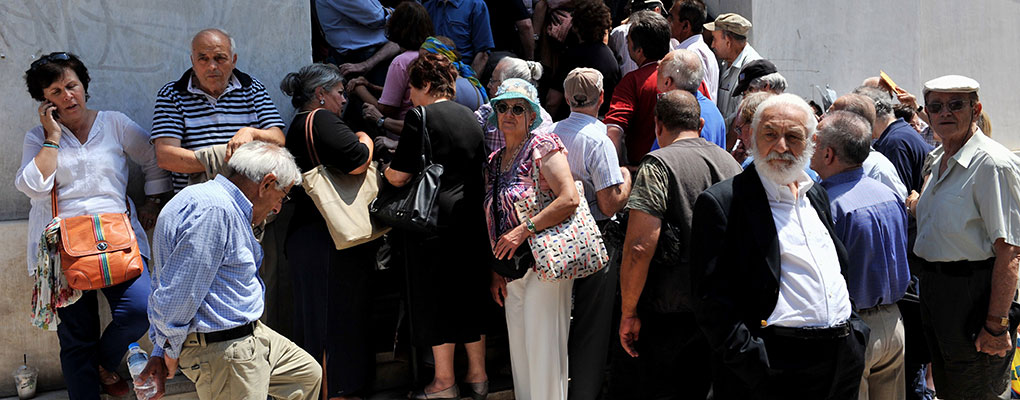
Following the announcement of a snap referendum, thousands of people across the country began drawing cash from their local ATMs over the weekend. In a bid to prevent more funds from being withdrawn and avert financial collapse, on June 29, the government ordered the temporary closure of Greek banks and the Athens Stock Exchange.
On June 26, Prime Minister Alexis Tsipras unexpectedly called for a national referendum regarding the cash-for-reforms deal; unable to decide the fate of the debt-ridden country, the Greek government has put the verdict in the hands of the people following another breakdown in negotiations with international lenders.
Athens has until June 30 to pay approximately €1.6bn owed to the IMF – the first in a series of upcoming repayments that are due, which will be extremely difficult to achieve without unlocking reforms. Yet the reforms proposed are deemed as unjust by the Greek parliament who have supported Tsipras’ decision to hold a referendum on July 5. “The creditors have not sought our approval but have asked for us to abandon our dignity. We must refuse,” Tspiras said in his televised address.
Athens has until June 30 to pay approximately €1.6bn owed to the IMF
Tsipras has since requested an extension of the bailout deadline, but was rejected by eurozone finance ministers, thereby raising the possibility that the deal being voted upon may not even be available when votes are cast.
In order to keep banks afloat in the meantime, cash machines will be limited to just €60 a day. Overseas transfers are not permitted, except for pre-approved commercial transactions. Cash withdrawal restrictions will not apply to with foreign credit cards and debit cards, so as not to drive tourists away.
Banks on hold: 10 institutions Greece’s government has closed
Domestic:
Alpha Bank
Attica Bank
Eurobank Ergasias
National Bank of Greece
Piraeus Bank
Greek branches of international banks:
Bank of America
Bank of Cyprus
Bank Saderat Iran
BMW Austria Bank
BNP Paribas Securities Services
The ECB declared on June 28 that it will not increase emergency funding to Greek banks, saying in a statement, “Given the current circumstances, the Governing Council decided to maintain the ceiling to the provision of emergency liquidity assistance (ELA) to Greek banks at the level decided on Friday”.
The ECB’s announcement and Greek capital controls have sent reverberations throughout European markets and even further afield. In France and Germany, stock markets fell by four percent, while banking shares tumbled by around 10 percent. The impact was also felt through Asia as shares slid by up to three percent in both Hong Kong and Tokyo.
In order to receive the latest bailout deal and remain in the eurozone, the Greek people must now vote on severe austerity measures and economic reforms. Eurozone leaders have blamed the Greek government for bringing a halt to negotiations, while Tsipras has lashed out against the terms being offered. On June 28, the commission released a statement outlining the proposal, which includes increasing the VAT rate and corporate income tax, abolishing oil subsidies for farmers and a drastic reform of the pension system.
Tsipras stated in his address that the Greek people will say no to such policies, believing that this will then strengthen his party’s bargaining position. Others believe that a yes will be voted for in the referendum as the population will opt to stay in the eurozone at all costs, for the consequences of a default would spell even further disaster for the struggling economy.
In spite of what many assume, missing the IMF repayment on June 30 will not necessarily cause a Greek default as credit rating firms focus on debt held by private-sector lenders and the IMF is obligated to give warnings when payments are missed before publishing a notice of default. Furthermore, under the loan terms outlined by the ECB and eurozone, rescue fund are also obligated to call in loans if payments are missed – although, whether they will be in a rush to do so remains doubtful.
Unwilling to go back on his pre-election campaign promises and relent to bullish tactics by international lenders, Tsipras has put this monumental decision in the hands of the people. Although the democratic notion is strong in such a move, many could argue that the slapdash manner in which the referendum was called is irresponsible. As such, the fate of Greece is now left to those living in panic as a result of capital controls and anger amid increasingly difficult economic pressures.


